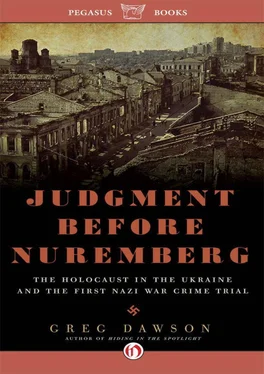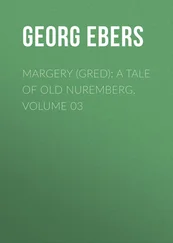Himmler unwittingly helped lay the foundation for post-war denial in December 1941 when he ordered that massacres during the day were to be followed by gemütlich evenings—social gatherings—which amounted to brainwashing, or conscience-cleansing, sessions. Psychiatrists would have had a field day with Himmler had he not committed suicide shortly after being captured by Allied troops in 1945. While the after-parties ostensibly were intended to foster bonding and loyalty among officers, Himmler appeared to be addressing, perhaps subconsciously, his own oft-stated revulsion for the slaughters. He became agitated and turned “white as cheese” while witnessing the shooting of Jews at Minsk early in Operation Barbarossa. At least in word, Himmler seemed more repulsed than many of the men who carried out his orders.
“It is the holy duty of senior leaders and commanders personally to ensure that none of our men who have to fulfill this burdensome duty should ever be brutalized or suffer damage to their spirit and character in doing so,” he stated in his gemütlich order, adding that it was “impermissible” to discuss “facts and related numbers” from the day’s events at such gatherings. “It should be an evening on which they sit and eat at table in the best German domestic style, and music, lectures, and introductions to the beauties of German intellectual and emotional life occupy the hours.”
This exactly describes the gatherings to which my Jewish mother and her sister were often summoned during the year they spent in Nazi-occupied Kremenchug in central Ukraine. Masquerading as non-Jews after escaping the ravines of Drobitsky Yar near their home in Kharkov, Zhanna and Frina made their way west to Kremenchug, where they served in a troupe of locals organized by Nazi commanders to keep their troops entertained. Some evenings, they were “invited” to dine with Wehrmacht field officers and Gestapo in their private quarters, and then to play for them—Bach, Beethoven, Chopin.
There were other practices and events that aided the killers in building emotional armor to deflect pangs of conscience or actual accountability for their crimes. One was the concept of Blutkitt , or “blood cement,” the result of group involvement in crimes such as shootings. The family that killed together stayed together. If everyone was guilty, no one was guilty. Physical as well as emotional distance from the crime made the Nazi conscience grow fonder of denial.
“The physical retreat from the Eastern occupied territories enabled the perpetrators to disassociate themselves psychologically from their crimes and facilitated their more or less smooth integration… into postwar German society,” wrote historian Jürgen Matthäus. “Even decades after the war, few of those former SS and policemen who became suspects or defendants in court cases displayed signs grasping the significance of what they had done in the East.” [5] Jürgen Matthaüs, “Controlled Escalation: Himmler’s Men in the Summer of 1941 and the Holocaust in the Occupied Soviet Territories,” Holocaust and Genocide Studies (Fall 2007), 229–230.
For those who ended up in the dock at Nuremberg, denial was just a river in Egypt. Their emotional armor could protect the killers from themselves—their own demons and consciences, if they had not totally atrophied from disuse—but not from the blunt force of law that pierced the armor and exposed their specious rationalizing about obedience to orders.
“The Charter of this tribunal recognizes that one who has committed criminal acts may not take refuge in superior orders nor in the doctrine that his crimes were acts of states,” said Robert Jackson, chief U.S. counsel, in his opening statement at Nuremberg. If those dodges were allowed, Jackson added, it would result in “immunity for practically everyone concerned in the really great crimes against peace and mankind.”
In a lovely coup de grâce of karmic justice—of what goes around and comes around—the final nail in the Germans’ legal coffin came from their own military code.
“If the execution of a military order in the course of duty violates the criminal law, then the superior officer giving the order will bear the sole responsibility,” Jackson said, quoting from the German code. He continued: “However, the obeying subordinate will share the punishment… if he has exceeded the order given to him, or if it was within his knowledge that the order of his superior officer concerned an act by which it was intended to commit a civil or military crime or transgression.”
The German Military Code thus effectively indicted every German soldier who had shot an unarmed Jew, slammed a Jewish baby against a rock, or filled a synagogue with the sick and insane and set it ablaze. But it was the officers who sent them to kill—on orders from Hitler, they reminded everyone in court—who faced justice at Nuremberg. Jackson made it clear the buck stopped with them. “Their responsibility is correspondingly great and may not be shifted to that fictional being, ‘the state,’ which cannot be produced for trial, cannot testify, and cannot be sentenced.”
The defendants, however, could be tried and sentenced—and they were. In the end, both their crimes and their guilt were—undeniable.
Coming of age in the sixties, the child of classical musicians on the faculty of a liberal arts university in the Midwest, I probably was destined to grow up liberal. My father was raised a Roman Catholic in Charlottesville, Va., no enclave of raging liberal thought in the early 1920s, but a prodigious talent for violin sent him at age fourteen to the Juilliard School of Music in New York where he absorbed the culture and progressive politics and became, in my mother’s words, “the best ‘Jew’ I ever knew.” He was against the Vietnam War before I was.
If anything, my mother was even more liberal. This made her a rare bird among Russian immigrants of her generation who as a group could be found holed up at the far right end of the American political spectrum. In some cases this no doubt was a reaction to harsh experiences in the Soviet Union. Others may have decided that adopting the views and rhetoric of Cold Warriors such as Barry Goldwater and Ronald Reagan was the best way of proving their bona fides as patriotic Americans. A desire to accommodate and fit in was not part of my mother’s DNA, to put it mildly.
I don’t remember my mother talking politics very much. She expressed her view on Vietnam by obtaining a letter from a renowned Indianapolis doctor stating that a congenital hip defect made me unfit for military purposes (among many other reasons). The letter resulted in a military classification similar to some of my college report cards: 4-F.
Her maternal instinct to keep her son safe aside, my mother’s liberalism was most evident in a powerful affinity and admiration for the oppressed and dispossessed, African-Americans in particular. In the sixties, she befriended leaders of the Black Student Union at IU and invited them to our home. Because of the troubles they’ve seen and survived, my mother regarded blacks as the most exemplary Americans. At the time, I knew nothing about her Holocaust experience, but now I better understand her visceral bond with the descendants of slaves and those forced to endure humiliation and insult at the whim of society.
For me the most surprising plank of my mother’s strict orthodox liberalism was an unswerving opposition to capital punishment. Conversely, this was the only liberal issue on which I was an apostate, and I could not account for it. There were no dots connecting the rest of my fundamentalist lefty agenda to a tolerance, if not embrace, of the death penalty. There was nothing in my life—no rape or murder of a family member—that would have given me a taste for eye-for-an-eye justice. At least nothing I was aware of on a conscious level. From time to time over the years, after I learned of her Holocaust experience, I did ask my mother if she would have opposed the death penalty even for Hitler. Yes, she said every time, killing an unarmed person was a cowardly, bestial act, no matter the person’s crime. I wonder, in this instance, if her hatred for Hitler was trumped by an instinctive solidarity with those whose great crime was simply being Jewish or black.
Читать дальше












